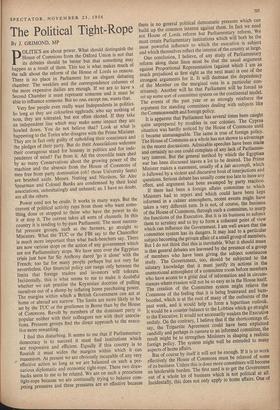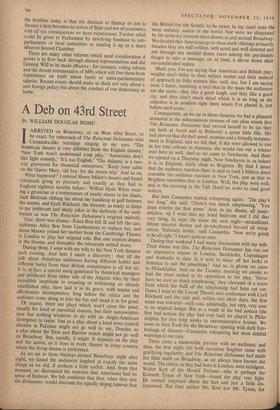The Political Tight-Rope
pOLITICS are about power. What should distinguish the House of Commons from the Oxford Union is not that its debates should be better but that something may happen as a result of them. This too is what makes much of the talk about the reform of the House of Lords so remote. There is no place in Parliament for an elegant debating chamber. The weeklies and the correspondence columns of the more expensive dailies are enough. If we are to have a Second Chamber it must represent someone and it must be able to influence someone. But no one, except me, wants that.
Very few people even really want Independents .in politics. So long as they are colourless eggheads, who say nothing of note, they are tolerated, but not often elected. If they take an independent line which may make some impact they are howled down. You do not believe that? Look at what is happening to the Tories who disagree with the Prime Minister. They are in fact only guilty of upholding their conscience and the pledges of their party. But do their Assocrations welcome their courageous stand for honesty in politics and for inde- pendence of mind? Far from it. All the crocodile tears shed by so many Conservatives about the growing power of the machine and the absence from the House of Commons of men free from party domination (oh ! those University Seats) are brushed aside. Messrs. Nutting and Nicolson, Sir Alec Spearman and Colonel Banks are condemned by their local associations, unhesitatingly and unheard; as, I have no doubt, are all the others.
Power need not be crude. It works in many ways. But the current of political activity runs from those who want some- thing done or stopped to tlise who have the power to do it or stop it. The current takes all sorts of channels. In this country it is tending to by-pass Parliament. The most success- ful pressure groups, such as the farmers, go straight to Ministers. What the TUC or the FBI say to the Chancellor is much more important than what back-benchers say. There are now various stops on the action of any government which are not Parliamentary stops. We have seen over the Egyptian crisis just how far Sir Anthony dared 'go it alone' with the French; too far for many people perhaps but not ,very far nevertheless. Our financial policy can range only between the limits that foreign traders and investors will tolerate. Incidentally, this is what seems to me to make it doubtful whether we can practise the Keynesian doctrine of pulling ourselves out of a slump by inflating home purchasing power. The margins within which a British Government can act at home or abroad are narrow. The limits are more likely to be set by the TUC or the gentlemen in Berne than by the House of Commons. Revolt by members of the dominant party is popular neither with their colleagues nor with their associa- tions. Pressure groups find the direct approach to the execu- tive more rewarding.
I find this disturbing. It seems to me that if Parliamentary democracy is to succeed it must find institutions which are responsive and efficient. Equally if this country is to flourish it must widen the margins within which it can manoeuvre. At present we are obviously incapable of any very effective action so long as we are balanced on such a pre- carious diplomatic and economic tight-rope. These two draw- backs seem to me to be related. We are on such a precarious tight-rope because we are continually trying to balance com- peting pressures and these pressures are so effective because there is no general political democratic pressure which can build ,up the common interest against them. In fact we need not House of Lords reform but Parliamentary reform. We must create Parliamentary institutions which will both be the most powerful influence to which the executive is subject and which themselves reflect the interest of the country at large.
One conclusion, I believe, of any study of Parliamentary reform along these lines must be that the usual argument against Proportional Representation (against which I am as much prejudiced at first sight as the next man) is one of the strongest arguments for it. It will decrease the dependency of the Member on the marginal vote in a particular con- stituency. Another will be that Parliament will be forced to set up some sort of committee system on the continental model. The events of the past year or so strongly reinforce the argument for standing committees dealing with subjects like the Commonwealth and foreign policy.
It is apparent that Parliament has several times been caught quite unprepared by troubles in our colonies. The Cyprus situation was hardly noticed by the House of Commons until it became unmanageable. The same is true of foreign policy. The House of Commons as a whole has not shown to advantage in the recent discussions. Admirable speeches have been made and certainly no one could complain of any lack of Parliamen- tary interest. But the general method by which the Egyptian war has been discussed leaves a lot to be desired. The Prime Minister makes a statement, usually of a fait accompli, which is followed by a violent and discursive bout of interjections and questions. Serious debate has usually come too late to have any effect, and argument has been swamped by party reaction. If there had been a foreign affairs committee to which Ministers had to report and which could have been kept informed in a calmer atmosphere, recent events might have taken a very different turn. It is not, of course, the business of the House of Commons, through such a committee, to usurp the functions of the Executive. But it is its business to subject them to scrutiny and' to try to form a coherent point of view which can influence the Government. I am well aware that the committee system has its dangers. It may lead to a particular subject becoming the private affair of a small group of members. But 1 do not think that this is inevitable. What it should mean is that general debates are leavened by the presence of a group of members who have been giving the subject continuous study. The Government, too, should be subjected to the salutary knowledge that it must justify its actions in the unemotional atmosphere of a committee room'before members who have access to a great deal of information and in circum- stances where evasion will not be so easy as in the House itself.
The creation of the Committee system might relieve the Commons of the feeling that it is being frustrated and bam- boozled, which is at the root of many of the outbursts of the past week, and it would help to form a bipartisan outlook. It would be a counter-balance to the Lobbies which go straight to the Executive. It would not necessarily weaken the Executive unduly. On the contrary, I believe that if the shortcomings of, say, the Tripartite Agreement could have been explained candidly and perhaps in camera to an informed committee, the result might be to strengthen Ministers in shaping a realistic foreign policy. The system might well be extended to many aspects of home affairs.
But of course by itself it will not be enough. If it is to work effectively the House of Commons must be relieved of some of its business. Unless this is done more committees will become an Intolerable burden. The first need is to get the Government out of a whole lot of business which is not political at all. Incidentally, this does not only apply to home affairs. One of the troubles today is that the decision ,to finance or not to finance a dam becomes an action of State and not of economics, with all the consequences we have experienced. Further relief could be given to Parliament by devolving business to sub- parliaments or local authorities or sending it up to a more effective Second Chamber.
There are many other reforms which need consideration if power is tg flow back through elected representatives and the General Will to be made effective : for instance, voting reform and the decent remuneration of MPs which will free them from dependence on trade union funds or extra-parliamentary salaries. Recent events should make us think not only about a new foreign policy but about the conduct of our democracy at home.











































































 Previous page
Previous page